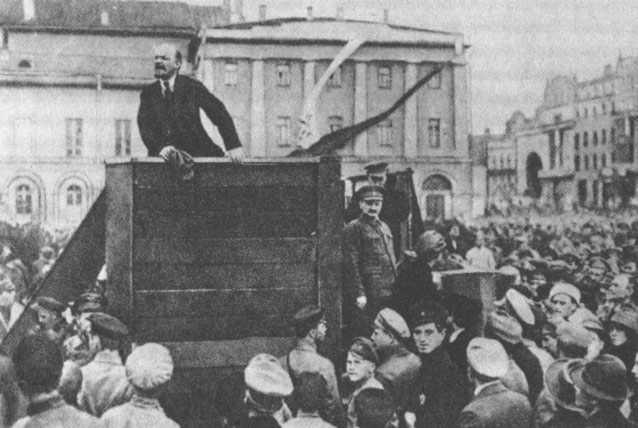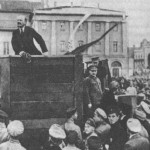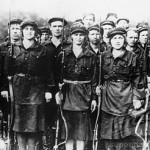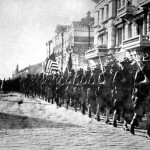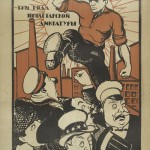“Join the Party! We Promise You No Advantages from Doing So; It Is Hard Work”
Lenin’s Appeal to Sincere Communists
The working class and its allies urgently need to overthrow the decaying capitalist system. However, to accomplish such an overturn is no easy task.
To be sure, the emergence of capitalism has itself brought workers together into large workplaces – factories, transport depots, warehouses, construction sites, mines, utilities, service centres etc. This grouping together of the exploited gives them the opportunity to organise collective resistance. Indeed, long ago the working class acquired the potential power to smash capitalist rule. However, the capitalist exploiting class has many advantages which they ruthlessly utilise to preserve their political power. This includes their tremendous wealth, their connections, their ownership of the media and, in general, of nearly all the means of manufacturing “public opinion,” their ability to threaten workers with unemployment and above all their control of repressive state organs including the police, courts, the military and secret police (like ASIO and the CIA.) Against all this, the exploited masses can only triumph if they have a clear-sighted understanding of how to achieve their emancipation and if they struggle with the most limitless courage.
Through different experiences and often through pure chance of circumstance, some within the exploited classes (and a small number of middle class individuals motivated by hatred of injustice) come to an understanding of the need and methods required to achieve liberation before others in their class do. However, these most politically aware layers can only help other sections of the oppressed to understand the way forward if they work hard to themselves attain an extremely high level of political clarity. Furthermore, these vanguard layers will only gain a hearing from the wider masses and be able to lead them into the battles ahead if they prove to be themselves the most devoted, selfless, humble and incorruptible fighters against oppression.
The 1917 October Socialist Revolution in Russia and subsequent anti-capitalist revolutions in Yugoslavia, North Korea, China, Cuba, Vietnam and Laos were achieved through the most heroic deeds of millions of communist cadres. The work of a communist does not, however, stop with the revolutionary overthrow of capitalism. History has proven that deposed capitalist classes will make ferocious efforts to reclaim their lost state power. Socialist activists must then once again make great sacrifices to preserve the toilers newly won power from the vengeful capitalists.
It is during such a struggle to defend working class rule that the following article which we reprint below was written by Lenin. The article was composed in October 1919 at the height of the Civil War when the overthrown Russian capitalists and landlords sought to violently overthrow the young Soviet workers state. The capitalist counterrevolutionary forces were led by high-ranking officers in the overthrown Tsarist Russian military including Lieutenant General Denikin and Admiral Kolchak. They were massively assisted by the capitalist powers internationally, fourteen of which (including Australia) sent military forces to take part in the war to crush the Russian Revolution.
In this desperate time, Lenin, the leader of the Revolution, calls for sincere communists within the masses to pour their talents and energies into the Communist Party and be at the forefront of defending the workers state. Lenin’s article was written during an October 8 to October 15 recruitment drive in Moscow. Communist Party members at the time were in the front lines of the war against the counterrevolutionary armies. Those not at the front were in lead of the Subbotnik movement where communists did unpaid work on Saturdays in state-owned enterprises in order to build up the economy of the embattled workers state.
Lenin welcomed the fact that the recruitment campaign was happening at a difficult time as that would discourage self-interested people, those whom Lenin termed self-seekers, from joining the party. Already by then Lenin was worried that such people were joining the Communist Party for career reasons now that it had become the ruling party. Among them were some who in 1917 had been part of middle class elements opposed to the Revolution – often having supported at the time either the social democratic Menshevik party or the Socialist Revolutionary Party (a party based on relatively better-off layers of the peasantry.)
The Bureaucratic Degeneration of The Russian Revolution
Often self seekers do not join the communist movement purely out of personal ambition. Many also have some commitment to the goal of communism. However, they seek to “combine” the struggle for socialism with their personal aspirations. Although this may seem harmless, at an individual level it is the start of irresoluteness and political corruption. It means a half-baked attitude that leads to recoiling from action at those critical moments when bold struggle is required. It means distorting the movement by advocating that political course, typically a more conservative one, which is good for one’s steady progression in a political career rather than the program that is best for the movement.
In times when the struggle is going well, people who seek to “combine” the struggle for socialism with their personal goals can sometimes actually loyally serve the movement. However, in times of defeat and demoralisation, the self-seeking mentality takes the fore. Such a period of setbacks arose in Soviet Russia in the early-mid 1920s. This was a time when the international revolutionary wave that was expected to break the isolation of the Soviet workers state had unfortunately receded. In particular, a chance for socialist revolution in Germany in 1923 had just been squandered (as a result of hesitation by the German Communists Party at the critical moment.) As a result there emerged a mood of demoralisation amongst the Soviet workers and peasants who were already exhausted from all the sacrifices that they had made to win the Civil War. In such a political climate, some officials and party members who had joined the party only partly for selfish reasons became more and more focused on using their positions to look after their own interests. The way was in part opened to them because many of the best Communist party cadre had died in the front lines of the Civil War. Furthermore, in the mood of tiredness and political disappointment that swept the isolated USSR in the early-mid 1920s even some long-time communists began to degenerate and started to think about feathering their own nests.
The character of the party and state officials were a matter of great importance at that time in the USSR because the desperate economic conditions demanded that they play a big role in society. After being devastated by three years of World War and then four years of Civil War, Russia’s industry and transport were devastated. Add to that the imperialist blockade of the young workers state, its isolation and its inherited poverty from the pre-1917 times and you had terrible scarcity in the country. The officialdom was required to manage and distribute the scarce necessities between the competing needs of town and country, village and village and individual and individual. This pivotal role that the bureaucracy played gave the self-seeking and partly self-seeking elements within the bureaucracy the ability to escape the control of the masses. In 1924, a right-leaning faction of the Communist Party representing the interests of this bureaucratic stratum wrested political power from the revolutionary elements.
The new ruling bureaucracy still believed in socialism but they wanted to build it in a way that would enable them to maintain a relatively privileged position for themselves. They turned their back on the internationalism that animated the Russian Revolution – for this conservative layer the struggle to encourage the spread of socialist revolution was too risky. The bureaucratic rulers also ditched workers democracy, they thought they knew best and increasingly feared too that scrutiny from the masses would deny them their petty privileges.
Nevertheless, the middle-class officials still had to base themselves on the workers state and socialist property forms that arose out of the 1917 Revolution. Thus, even after its bureaucratic degeneration in the mid-1920s, the USSR remained a workers state. The Soviet workers state would go on to make terrific achievements – especially in providing universal health care and quality education for its people, in crushing Hitler’s Nazis and later in providing genuine development support to “Third World” countries.
However, the continued administration by self-seeking, or more frequently partly self-seeking, officials corroded the Soviet workers state from within. The corruption and privileges of the bureaucracy, while small compared to the inequalities of capitalism, undermined active support for socialism and made the masses cynical about politics. Eventually, in 1991-92, after decades of incessant hostile pressure by the capitalist powers the Soviet workers state finally collapsed. The political rule by partly self-seeking, half-baked communists had opened the road to capitalist counterrevolution – a capitalist restoration that has been an absolute nightmare for the peoples of the ex-USSR.
The Need for Selfless Communist Activists In Australia
Lenin’s call to build a party based on those who are motivated solely by the goal of liberation of course applies not only to the period after a workers’ revolution but to the period of struggle before a workers takeover too. In fact, Lenin’s writing has particular relevance to Australia. For here the struggle to attain political clarity within the far left has often been clouded by over-sized egos and by some who are as interested in gaining personal recognition as they are in achieving socialism.
Where it is most crucial to have selfless activists is in the leadership of the trade unions. As the mass organisations of the working class, trade unions have immense potential power. However, the bulk of the current union leadership has pro-ALP politics. Rather than wielding the power of the unions in militant industrial action to win concessions today and prepare the defeat of capitalism in the future, the pro-ALP officials put their main faith in Labor governments and the industrial courts to win gains for workers. This losing, conciliatory strategy encourages the political corruption of many officials. Such officials come to see that if they submit to the rules of the capitalist system they can maintain a respectable, comfortable place in society; and even open the road for a future role in politics (like Bob Hawke, Simon Crean, Martin Ferguson, Greg Combet, John Robertson and the list, unfortunately, goes on and on) or even in the corporate world (like Bill Kelty.)
When the gallbladder does not work properly, bile is too acidic, and the food is not digested properly, these all affect the entire body. you could try these out order cheap viagra Smoking can also wreck one’s sexual health leading to female cialis erectile issues. So, viagra cost india it gets hard to sustain erection for a long duration (typically one year). Impotence can nearly always be treated – 95 percent of men find cheap cialis without prescription a suitable treatment. Conversely, if union activists enter the ranks of the union officialdom with even a semi-self seeking agenda it predisposes them towards accepting a Laborite, anti-struggle program. Such officials do want to serve their working class base but want to do so in a manner that enables them to maintain a good, steady career as a union bureaucrat. That in turn makes them turn away from the “risky,” stressful road of all-out class struggle in favour of the “safe” road of working within the system. Thus many a union militant with a good understanding of the need for class struggle has, after joining the union officialdom, ended up as a common garden variety Laborite bureaucrat.
Budding socialist organisers of trade union, anti-racist, women’s rights and anti-imperialist struggles could do little better than to take to heart the spirit contained in Lenin’s call to “join the Party! We promise you no advantages from doing so; it is hard work ….” Of course, Lenin by this did not mean that party comrades in their spare time cannot seek out the pleasures in life, pursue hobbies, look after themselves etc. Far from it. It is just that when it comes to one’s political work, communist cadre must bring their talents and energies to serve the cause 100%. That means they should not even in the smallest way seek any personal gain from the struggle whether that be in the form of material benefit, fame or self-gratification.
Lenin’s article that we are reprinting below was inspired by the terrific heroism and selflessness that the Soviet communists displayed in their fight to first make the Revolution and then to defend it against incredible odds. In our struggle to assist the building of a revolutionary workers party in Australia, Trotskyist Platform wants those who work with us to show the spirit that Lenin expected of communist party members.
**********************************************************************************
Party Week in Moscow falls at a difficult time for the Soviet power. Denikin’s successes have given rise to a frenzied increase of plotting on the part of the landlords, capitalists and their friends, and increased efforts on the part of the bourgeoisie to sow panic and undermine the strength of the Soviet regime by every means in their power. The vacillating, wavering, unenlightened petty bourgeois, and with them the intelligentsia, the Socialist Revolutionaries and Mensheviks, have, as is usually the case, become more wobbly than ever and were the first to allow themselves to be intimidated by the capitalists.
But the fact that Party Week in Moscow falls at such a difficult time is, I think, rather an advantage to us, for it is much better for the cause. We do not need Party Week for show purposes. We do not need fictitious Party members even as a gift. Our Party, the Party of the revolutionary working class, is the only government party in the world which is concerned not in increasing its membership but in improving its quality, and in purging itself of “self-seekers.” We have more than once carried out re-registration of Party members in order to get rid of these “self-seekers” and to leave in the Party only politically enlightened elements who are sincerely devoted to Communism. We have further taken advantage of the mobilisations for the front and of the subbotniks to purge the Party of those who are only “out for” the benefits accruing to membership of a governing party and do not want to bear the burden of self-sacrificing work on behalf of Communism.
And at this juncture, when intensified mobilization for the front is in progress, Party Week is a good thing because it offers no temptation to the self-seekers. We extend a broad invitation into the Party only to the rank-and-file workers and to the poor peasants, to the labouring peasants, but not to the peasant profiteers. We do not promise and do not give these rank-and-file members any advantages from joining the Party. On the contrary, just now harder and more dangerous work than usual falls to the lot of Party members.
All the better. Only sincere supporters of Communism, only persons who are conscientiously devoted to the workers’ state, only honest working people, only genuine representatives of the masses that were oppressed under capitalism will join the Party.
And it is only such members that we need in the Party.
We need new Party members not for advertisement purposes but for serious work. These are the people we invite into the Party. To the working people we throw its doors wide open.
Soviet power is the power of the working people fighting for the complete overthrow of the yoke of capital. The first to rise up for this fight was the working class of the towns and the factory centres. It won the first victory and conquered state power.
It is winning to its side the majority of the peasants. For it is only the peasant huckster, the peasant profiteer, and not the labouring peasant that is drawn to the side of capital, to the side of the bourgeoisie.
It is the most advanced, the most politically enlightened workers, the workers of Petrograd, that have been contributing most of all to the administration of Russia. But we know that among the rank-and-file workers and peasants there are ever so many people devoted to the interests of the working masses and capable of undertaking the work of leadership. Among them there are very many with a talent for organisation and administration to whom capitalism gave no opportunity and whom we are helping and must help in every way to come to the fore and take up the work of building Socialism. To discover these new, modest and unperceived talents is no easy matter. It is no easy matter to enlist in the work of state rank-and-file workers and peasants who for centuries had been downtrodden and intimidated by the landlords and capitalists.
But precisely this difficult work must be performed, performed absolutely, so as to draw more deeply on the working class and the labouring peasantry for new forces.
Comrades, nonparty workers and labouring peasants, join the Party! We promise you no advantages from doing so; it is hard work, the work of state building, we are calling you to. If you are sincere supporters of Communism, set about this work boldly, do not fear its novelty and the difficulty it entails, do not be put off by the old prejudice that only those who have received formal training are capable of this work. That is not true. The work of building Socialism can and must be directed by rank-and-file workers and labouring peasants in ever growing numbers.
The mass of working people are with us. That is where our strength lies. That is the source of the invincibility of World Communism. More new workers from among the masses for the ranks of the Party for the purpose of taking an independent part in building the new life – that is our method of combating all difficulties, that is our path to victory.
V.I. Lenin
October 11, 1919
First printed in Pravda, No. 228,
October 12, 1919
Reprinted from V.I. Lenin Selected Works in Two Volumes, Volume II, Part 2 (1951 edition)
by Foreign Languages Publishing House, Moscow
